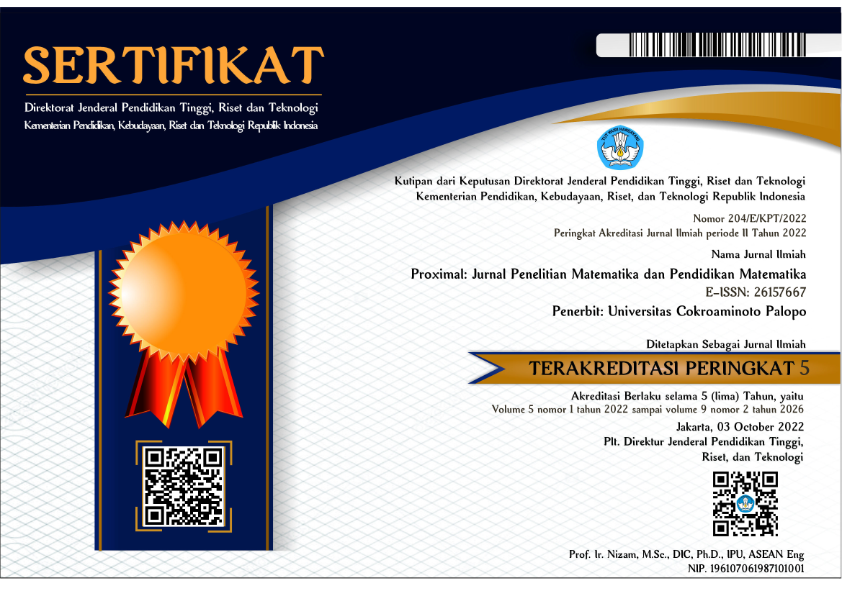Adaptive Instructional that Supports Mathematical Understanding
DOI:
https://doi.org/10.30605/proximal.v6i1.2171Keywords:
Adaptive Instructional, , Mathematical UnderstandingAbstract
Dalam sebuah kelas, guru dapat membedakan kategori siswa berdasarkan minat, kesiapan belajar, dan pengalaman belajarnya terdahulu. Dinamika tersebut mendorong guru untuk mengakomodasi kebutuhan belajar siswanya dengan baik. Untuk itu diperlukan suatu teknik pengajaran adaptif yang dapat membantu siswa menemukan sendiri makna pengetahuannya. Penelitian ini merupakan penelitian tindakan kelas (kolaboratif) yang merefleksikan upaya guru dalam meningkatkan pemahaman matematis siswanya melalui adaptive instructional. Instrumen penelitian berbentuk lembar observasi, catatan lapangan, rekaman video, dan tes pemahaman matematis. Penelitian kami lakukan melalui open class sebanyak tiga siklus. Hasilnya menunjukkan trend positif bahwa perubahan pembelajaran (redesain) yang dilakukan dari satu siklus ke siklus berikutnya dapat mempengaruhi perilaku belajar siswa. Jika pada siklus awal aktivitas siswa hanya mengamati, meniru, menulis, dan mengerjakan soal, maka pada siklus kedua dan ketiga aktivitas mereka bertambah lengkap. Ada proses menalar, menduga, memeriksa, dan mengkomunikasikan gagasan baik secara lisan maupun tertulis. Tambahan aktivitas-aktivitas yang muncul merupakan akibat dari adaptive instructional guru. Suatu kejelian guru dalam memetakan kebutuhan belajar siswa yang belum terpenuhi dan menyusun kembali desain pembelajaran adaptif sehingga dapat memenuhi kebutuhan belajar siswanya.
Downloads
References
Agathangelou, S., & Charalambous, C. (2020). Is content knowledge pre-requisite of pedagogical content knowledge? An empirical investigation. Journal of Mathematics Teacher Education, 431-458. DOI: https://doi.org/10.1007/s10857-020-09466-0
Cascella, C., Clelia, C., & Viale, M. (2022). Investigating foreign students’ disadvantage in mathematics: A mixed method analysis to identify features of items favouring native students. The Journal Mathematical Behaviour, 71-89. DOI: https://doi.org/10.1016/j.jmathb.2022.100990
Conner, A. M. (2022). Adaptive instruction that supports collective argumentation. The Journal of Mathematical Behaviour, 92-110. DOI: https://doi.org/10.1016/j.jmathb.2022.100969
Coppola, C., Iannaccone, A., Mollo, M., & Pacelli, T. (2022). Handling a language to think together in the classroom: The case of the notion of equivalence. The Journal of Mathematical Behaviour, 65-80. DOI: https://doi.org/10.1016/j.jmathb.2022.100951
Ellis, A., & Zaslavsky, O. (2019). Student thinking with examples: The criteria-affordances-purposes-strategies framework. The Journal of Mathematical Behaviour, 263-283. DOI: https://doi.org/10.1016/j.jmathb.2017.06.003
Hodgson, L., & Wilkie, K. (2021). Modelling lessons for more than imitation: investigating teachers’ reactions and decompositions of unfamiliar practices. Journal of Mathematics Teacher Education, 749–775. DOI: https://doi.org/10.1007/s10857-021-09516-1
Lahdenperä, J., Rämö, J., & Postareff, L. (2022). Student-centred learning environments supporting undergraduate mathematics students to apply regulated learning: A mixed-methods approach. The Journal of Mathematical Behaviour, 1-15. DOI: https://doi.org/10.1016/j.jmathb.2022.100949
Seino, T., & Foster, C. (2020). Analysis of the final comments provided by a knowledgeable other in lesson study. Journal of Mathematics Teacher Education, 507–528. DOI: https://doi.org/10.1007/s10857-020-09468-y
Sheppard, M., & Wieman, R. (2020). What do teachers need? Math and special education teacher educators’ perceptions of essential teacher knowledge and experience. The Journal of Mathematial Behaviour, 321-338. DOI: https://doi.org/10.1016/j.jmathb.2020.100798
Simon, L., & Cox, D. (2019). The role of prototyping in mathematical design thinking. The Journal Of Mathematical Behaviour, 213-233. DOI: https://doi.org/10.1016/j.jmathb.2019.100724
Simon, M. A. (2022). Contributions of the learning through activity theoretical framework to understanding and using manipulatives in the learning and teaching of mathematical concepts. The Journal of Mathematical Behaviour, 40-65. DOI: https://doi.org/10.1016/j.jmathb.2022.100945
Stuhlmann, A. S. (2021). Interactionist perspective on negotiation processes of students’ different understandings during small group work on linear algebra. The Journal of Mathematical Behaviour, 173-189. DOI: https://doi.org/10.1016/j.jmathb.2021.100911
Sun, L. K. (2019). The mindset disconnect in mathematics teaching: A qualitative analysis of classroom instruction. The Journal of Mathematical Behaviour, 131-147. DOI: https://doi.org/10.1016/j.jmathb.2019.04.005
Vroom, K. (2022). A functional perspective on student thinking about the grammar of multiply quantified statements. The Journal of Mathematical Behaviour, 85-100. DOI: https://doi.org/10.1016/j.jmathb.2022.100992
Yopp, D. (2018). When an argument is the content: Rational number comprehension through conversions across registers. The Journal of Mathematical Behaviour, 213-237. DOI: https://doi.org/10.1016/j.jmathb.2018.01.001
Downloads
Published
How to Cite
Issue
Section
License
In submitting the manuscript to the journal, the authors certify that:
- They are authorized by their co-authors to enter into these arrangements.
- The work described has not been formally published before, except in the form of an abstract or as part of a published lecture, review, thesis, or overlay journal.
- That it is not under consideration for publication elsewhere,
- That its publication has been approved by all the author(s) and by the responsible authorities – tacitly or explicitly – of the institutes where the work has been carried out.
- They secure the right to reproduce any material that has already been published or copyrighted elsewhere.
- They agree to the following license and copyright agreement.
License and Copyright Agreement
Authors who publish with this journal agree to the following terms:
- Authors retain copyright and grant the journal right of first publication with the work simultaneously licensed under Creative Commons Attribution License (CC BY 4.0) that allows others to share the work with an acknowledgment of the work's authorship and initial publication in this journal.
- Authors are able to enter into separate, additional contractual arrangements for the non-exclusive distribution of the journal's published version of the work (e.g., post it to an institutional repository or publish it in a book), with an acknowledgment of its initial publication in this journal.
- Authors are permitted and encouraged to post their work online (e.g., in institutional repositories or on their website) prior to and during the submission process, as it can lead to productive exchanges, as well as earlier and greater citation of published work.















